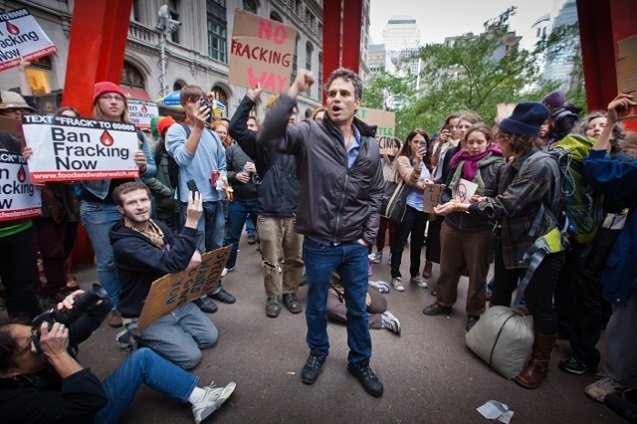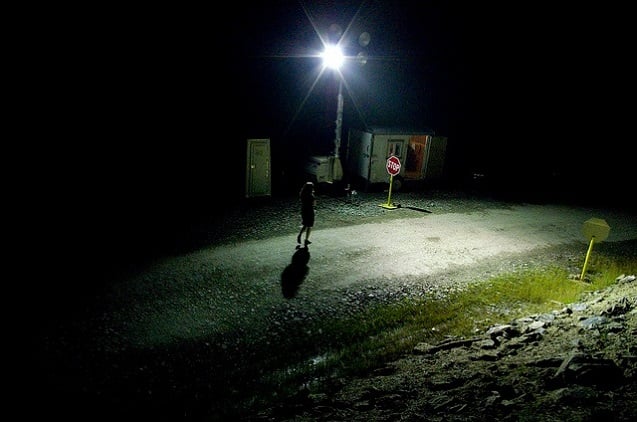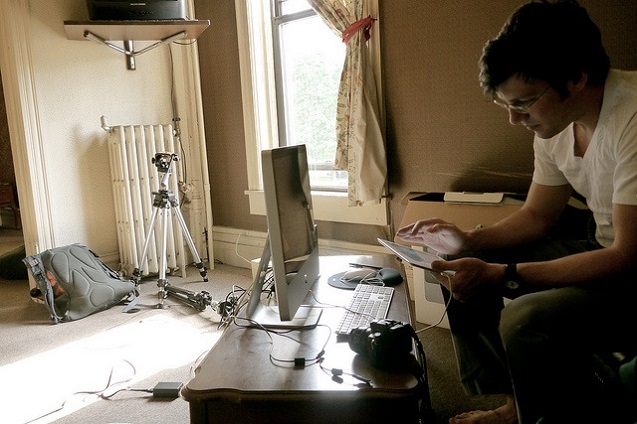Part of the Series
Gas Rush: Fracking in Depth
Honest, paywall-free news is rare. Please support our boldly independent journalism with a donation of any size.
 Mark Ruffalo in Zuccotti Park with Occupy Wall Street protesters. (Photo: ©2011 Julie Dermansky)
Mark Ruffalo in Zuccotti Park with Occupy Wall Street protesters. (Photo: ©2011 Julie Dermansky)
“Triple Divide” is a timely cautionary documentary about the fracking industry in Pennsylvania. Clean water is the star of this film. The toxic impact of the fracking industry is the villain.
The film is a PublicHerald.org production, co-directed by journalists Joshua Pribanic and Melissa Troutman, and it features actor Mark Ruffalo as one of the narrators.
Using powerful camera work and informative animation, “Triple Divide” offers gripping first-hand accounts from landowners whose lives have been negatively impacted by fracking.
Industry leaders, scientists, lawyers and politicians share the screen with Pennsylvania’s rural landscape, defaced by the influx of industrial development.
The movie raises the question, “How are state regulators and industry handling the impact of fracking?” and answers it by presenting examples of violations of state regulations.
“Triple Divide” presents example after example of Pennsylvania Department of Environmental Protection (DEP) doing little to curtail the fracking industry’s rule-breaking practices despite the agency’s awareness of the violations.
President Obama reaffirmed his support for the natural gas industry — which is propelled by fracking — in his recent State of the Union address, with the condition it be extracted safely.
But “Triple Divide” shows how lack of enforcement and inadequate regulations threaten some of Pennsylvania’s most pristine waterways.
Watch the trailer for Triple Divide:
DeSmogBlog discussed “Triple Divide” with its directors and Mark Ruffalo.
DeSmog interview with Mark Ruffalo
How did you get involved with the filmmakers?
Josh and Melissa reached out to me and asked me to do a bit of the narration on the film. The people who are doing this work are mostly independent journalists that are connected to the community in one sense or another. They are committed to telling the story from the point of view of the people who are living with it.
Because of the consolidation of corporate media these types of folks, the ones dedicated to truly investigative journalism, like Josh and Melissa, are few and far between.
So when I got a chance to look at the film, what struck me, what moved me to being part of it was its even-handed nature, its commitment to science and its thoughtful consideration to the people they have invited to tell their personal stories and the travails of dealing with the industrial build out of Hydrofracking.
Why is it important for people to see this film?
When you have huge corporations drenching the media with a constant barrage of pro Fracking propaganda coupled with a regulatory system that has been gamed to favor those corporations then it becomes very important to find other ways to discover the truth of what is happening in these communities. Historically, documentaries such as “Triple Divide” bring an entirely new understanding and counter narrative to the one that is being sold to us by popular media and the overwhelming influence a large corporation’s ad dollars have on it.
It is important for people to see this film to get a more honest understanding of what is happening to people that decide to allow Fracking into their communities and lives. What Triple Divide clearly illustrates is how a single industry can infiltrate all the regulatory safeguards and agencies a democracy puts into place and run slipshod over justice and the basic needs of life; clean water, air and land. This movie lets people know what they are in for when the invite the Gas industry into their communities and it is told with science, and great reporting.
Currently what actions are you taking to educate people about fracking?
By talking about it. By engaging people and carrying the stories of those that have been affected by it to the media. I engage in social media and educate other cultural influencers such as myself to the parallel and more honest narrative that the industry spins with its vast amounts of money and political leverage.
I am also engaging people on why we don’t need to move forward on destroying our localities and water sources. We don’t need to industrialize our farmlands and open spaces, we don’t need to deplete our water sources by injecting enormous amounts of fresh water deep into the ground never to be retrieved again while half of our nation is covered in drought caused by climate change.
The good news is — for real energy independence and jobs — renewable, clean and sustainable energy is available to us today, with the technology that is currently on the shelf.
To make this transition will save millions of lives a year (3.5 million people a year die from fossil fuel pollution), billions upon billions of dollars in related health care costs, we’ll create millions of jobs, stabilize and slow down climate change, stabilize geopolitical turmoil, and bring on the second industrial revolution of innovation and economic growth.
Natural gas is 70 times more harmful to the atmosphere then CO2 in a 20-year period and 38 times more damning then CO2 in a 100-year period. The natural gas infrastructure will cost us trillions to build out on the presumption that natural gas is only a bridge fuel to renewable energy.
Why not just take that money and invest it where we are going to all end up anyway? That is, if we do believe that climate change is real and that it will need to be addressed sooner rather then later.
 Co-director Melissa Troutman walks toward a drill rig in Tioga State Forest. (Photo:© jbpribanic)
Co-director Melissa Troutman walks toward a drill rig in Tioga State Forest. (Photo:© jbpribanic)
DeSmog interview with Melissa Troutman
What should the public know about the fracking regulatory process?
The regulatory process is subject to the will and whim of politicians, many of whom are bought off by corporations. I’m not a policy maker, but it seems that engaging the public in the regulatory process could safeguard against this. It’s all of our responsibility to protect ourselves and our environment anyway, right?
Right now, when your water “goes bad” you’re on your own. The regulators won’t save you because they aren’t working for you. On the other hand, a regulatory process operated by the people would more likely actually be for the people. It’s a powerful tool but currently in the wrong hands.
 Co-director Joshua Pribanic sets up a makeshift studio. (Photo: © Melissa Troutman)
Co-director Joshua Pribanic sets up a makeshift studio. (Photo: © Melissa Troutman)
DeSmog interview with Joshua Pribanic
In the film you mention the Department of Environmental Protection (DEP) never answered your questions, nor did industry. It makes sense industry would stay quiet on anything that might point the finger at them as a responsible party to contaminating water or breaking a rule, but what are your thoughts/feelings about the DEP not answering your questions?
My thoughts are DEP is betraying the public trust. Triple Divide would not be the film you watched if it weren’t for the way DEP treats residents as well as journalists, while cooperating at every turn with industry.
My co-director, Melissa Troutman, and I realized after our third landowner interview that the story about fracking in Pennsylvania had to start with DEP’s negligence for public resources and people. Their ongoing silence and lack of action continues to dig their own grave.
What is the take away you hope anyone watching your film gets?
I hope people walk away from Triple Divide with a conscience. It’s only by awareness that we can have a perspective and make decisions. Triple Divide is more about a missing conscience, missing pieces in a puzzle, to remind us how united we are over something as out-of-sight and out-of-mind as how a glass of water is regulated. I hope that the careful steps we took as investigative journalists were able to help convey a clear conscience about fracking.
What have you learned since the making of this film?
I’ve learned DEP is an agency beyond repair; it needs radical change. At this time, state regulations are operating to facilitate industry interests when they’re supposed to be acting as the discipline.
The public is hardly seeing the full scale of impacts from fracking either because the Department is mismanaging the data, or they’re making decisions based on politics and not by science (as in the case of presumed liabilities).
The hardest lesson in all this is that the problem is systemic. From national to state regulators; they’re all in need of radical change.
I would say I learned we need a revolution for regulation, for politics for the whole damn thing.
A terrifying moment. We appeal for your support.
In the last weeks, we have witnessed an authoritarian assault on communities in Minnesota and across the nation.
The need for truthful, grassroots reporting is urgent at this cataclysmic historical moment. Yet, Trump-aligned billionaires and other allies have taken over many legacy media outlets — the culmination of a decades-long campaign to place control of the narrative into the hands of the political right.
We refuse to let Trump’s blatant propaganda machine go unchecked. Untethered to corporate ownership or advertisers, Truthout remains fearless in our reporting and our determination to use journalism as a tool for justice.
But we need your help just to fund our basic expenses. Over 80 percent of Truthout’s funding comes from small individual donations from our community of readers, and over a third of our total budget is supported by recurring monthly donors.
Truthout has launched a fundraiser, and we have a goal to add 242 new monthly donors in the next 48 hours. Whether you can make a small monthly donation or a larger one-time gift, Truthout only works with your support.